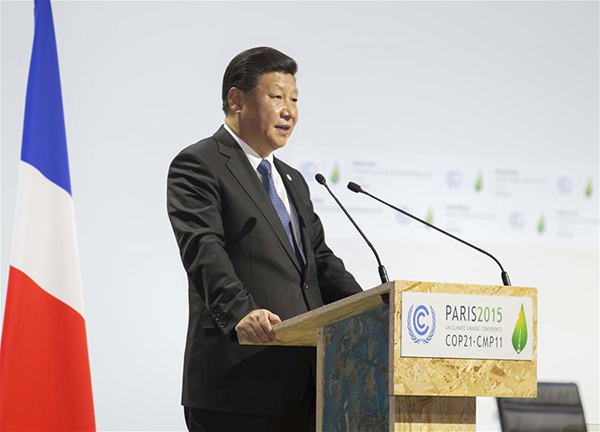Why Paris talks are important for businesses?
Updated: 2015-12-12 08:12
By Xiaochen Zhang and Qimin Chai(China Daily)
|
|||||||||
 |
|
Chinese President Xi Jinping delivers a speech at the opening ceremony of the United Nations (UN) climate change conference in Paris, France, Nov. 30, 2015. [Photo/Xinhua] |
Addressing the opening ceremony of the climate change conference in Paris on Nov 30, Chinese President Xi Jinping urged businesses, non-governmental organizations and other players in society to pool resources to counter climate change, which poses a threat to not only the environment and natural resources, but also businesses in China.
Many companies in China are based in areas that are exposed to the risks of rising sea levels, floods and tropical storms. Losses from typhoons alone cost China 8.4 billion yuan ($1.3 billion) a year on average between 1994 and 2005, and since 2000 natural disasters have cost the country 1 percent of its GDP, eight times more than the global average. A large part of the costs have been borne by China-based companies.
Climate change has aggravated the geographical differences in China, making the southern region wetter and the northern drier. Long-term sustainability of businesses in China is threatened because of receding sources of water on the land.
Climate change could also have an impact on the availability of agricultural products for businesses. According to a center for science and policy report, an increase of 2 degrees Celsius in temperature could lead to a loss of more than one-third of China's rice production. Besides, drought- and flood-related losses to agriculture could exacerbate the input risks of businesses. Worse, large strips of the coastal regions and offshore islands will be affected.
Over the past 20 years, China has introduced both command and control policies and market instruments to make businesses adopt more environmentally friendly measures, with the trend gaining strength in the past year thanks to national and sub-national climate commitments, including the Intended Nationally Determined Contributions submitted to the UN Framework Convention on Climate Change in June 2015.
An increasing number of enterprises will be subjected to more stringent regulations, such as climate information disclosure, performance and technology standards, carbon pricing and environmental tax, to ensure China meets the INDC targets.
Related Stories
Asia Pacific: Response to climate change 2015-12-08 17:13
Paris summit highlights need for urgency on climate change 2015-12-04 09:09
Chinese carbon-capture grass cited as tool against climate change 2015-12-03 07:53
Chinese desertification control model at Climate Change Conference 2015-12-02 17:39
Xi Jinping expressed China's plan on Paris Climate Change Conference to contribute China's wisdom to global environmental governance 2015-12-02 13:58
World leaders gather for the World Climate Change Conference 2015-11-30 23:52
Today's Top News
Inspectors to cover all of military
Britons embrace 'Super Thursday' elections
Campaign spreads Chinese cooking in the UK
Trump to aim all guns at Hillary Clinton
Labour set to take London after bitter campaign
Labour candidate favourite for London mayor
Fossil footprints bring dinosaurs to life
Buffett optimistic on China's economic transition
Hot Topics
Lunar probe , China growth forecasts, Emission rules get tougher, China seen through 'colored lens', International board,
Editor's Picks

|

|

|

|

|

|







